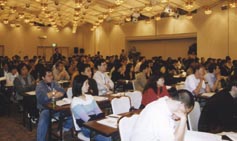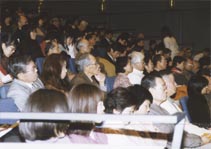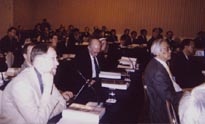  |
 |
 |
The
Fifth RIKEN BSI Retreat |
 |

5th RIKEN BSI RETREAT Heid
|
The 5th RIKEN
BSI Retreat was held for three days (from October 22nd to 24th) at the Heritage
Hotel in Shinrin-Koen.
The retreat provided an excellent opportunity for participants to step beyond
the walls of their laboratories to engage in informal discussion and constructive
debate with people working in other laboratories and research fields. Some 350
researchers, including participants from the RIKEN-MIT Center, attended this year's
retreat; and approximately 300 posters were presented. An enthusiastic question
and answer session also took place. The active discussion, which often transcended
the boundaries of research, undoubtedly stimulated the work of everyone involved.By
continuing to deepen mutual understanding between different fields and promoting
intellectual exchange, we hope to draw out useful results that utilize the characteristics
of the BSI and contribute to comprehensive brain science research. |
 |
 |
The 4th Japan-South Korea-China-India
Joint Workshop on Neurobiology and
Neuroinformatics(NBNI) |
 |
Despite a slowing
global economy, Asia is making dramatic progress. This region is expected to make
major scientific and economic contributions in the 21st Century. And it is hoped
that Japan will play an active and central role in assisting this progress.
Since the brain, which we are studying, is the organ that processes information
for organisms, a wide perspective based on both biological science and information
science is needed in order to elucidate its mechanisms. At BSI, we are continuing
to strive to make further progress in new brain science by fusing various approaches
and through collaboration with other Asian nations.
Four years ago, BSI agreed to form a cooperative relationship with the South
Korean brain science program, with KAIST (Korea Advanced Institute of Science
and Technology) as its base, to share the experiences and to play an active and
central role in Asia's scientific growth. The Japanese-South Korean Joint Workshop
on Neurobiology and Neuroinformatics (NBNI) was held as a part of this initiative.
This was a truly unique experiment, involving interdisciplinary cooperation among
the domains of understanding, protecting, and building brains.
The First NBNI was held at RIKEN, the next one at Kyong-ju in South Korea, and
then the Third, in which China participated, was held in Hangzhou, China. This
year, India's participation in the Fourth NBNI established a workshop line-up
that included the major Asian nations in a combined effort to advance brain science.
The conference was held at RIKEN on both November 25th and 26th.
About 10 cutting edge researchers from each country delivered lecture presentations,
which were followed by active discussions. In addition, there were tours of BSI
and personal interchanges between the participants. The event was a big success.
The advances made in raising the scientific level of Asian nations have been striking,
and RIKEN-BSI has played a major role in this process. The next NBNI will be held
in Korea, and the following one will be in India. |
 |
 |
"The
Brain and Education":
An Open Lecture for the General Public |
 |

"The Brain and Education": An Open Lecture for the General Public |
On Monday, December 9th,
a public lecture entitled "The Brain and Education: The Key to Future Society"
was held in Yokohama Landmark Hall. The session, which featured dialogue between
brain researchers and educators, hoped to transfer knowledge from brain science
to education to help solve child-related and educational issues, as well as find
ways to develop children's capacities healthfully.
The session featured lectures by Mr. Hideaki Koizumi, Chief Researcher of Hitachi's
Advanced Research Laboratory and the Central Research Laboratory, and Ms. Masuko
Honda, Director of Ochanomizu University. These lectures were followed by a five-member
panel discussion led by Dr. Masao Ito, Director of the RIKEN Brain Science Institute.
Approximately 250 people attended the session despite the snowstorm. Their questions
on such topics as "critical periods for the brain" and "the influence
games have on the brain" indicate the audiences' high expectations for and
level of interest in this subject. |
 |
 |
Life
Long Learning Network
(LLLN) Meeting |
 |

Life Long Learning Network (LLLN) Meeting
|
On December 10th and 11th
at Yokohama's Landmark Tower1, education policy makers and neuroscientists from
around the world met for the Life Long Learning Network (LLLN) Meeting. This network's
mission is to find ways to improve education offerings across individual life
spans. The Life Long Learning Network emerged from the "Learning Sciences
and Brain Research" project, which started in 1999 as an OECD initiative,
following three years of dialogue on how to encourage communication and collaboration
between brain researchers and policy-makers. Having established target populations
and a set of common interests surrounding the issue of brain research and learning,
three networks were established: Literacy, Numeracy, and Life Long Learning.
Neuroscientists, including Dr. Takao Hensch from BSI, presented recent findings
that contribute to the understanding of the learning brain. The presentations
were grouped into three sections that represent the stages of learning: infancy,
childhood and adulthood. Active discussion amongst the network's members, exploring
the potential contribution these results lend to shaping the direction of education,
followed each session.
LLLN is looking at how brain science can help educators respond to changing needs
of education across life spans. The network seeks to bridge the gap between the
education and brain research to increase the development of learning applications
founded on basic neuroscience, and to establish the fundamentals for a new science
of learning.
Together with the Literacy and Numeracy networks, Life Long Learning hopes to
identify how new understanding of the brain may help draft curricula which produce
adults who are able and willing to face new challenges, and to help direct research
to find answers to the crucial questions that will emerge when plotting the course
of education.
The meeting, co-hosted by RIKEN Brain Science Institute and the OECD, will convene
again in December 2003.
1Landmark Tower is the tallest building in Japan and offers a panoramic view of
Yokohama that includes Mt. Fuji on a clear day. |
 |
 |
|
|






